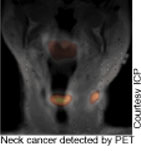 | |||||||||||||
Convention health bus: A health bus visiting both the Republican and Democratic conventions is giving attendees free screening tests for prostate and breast cancer, osteoporosis, and high cholesterol. The bus, sponsored by the Cancer Research Foundation of America and local health providers, highlights the important role that advanced diagnostic tests play in saving patients' lives and reducing health costs by detecting diseases earlier when they are more treatable. But will America's seniors and disabled gain access to these advanced technologies under Medicare? New tests for prostate and breast cancer promise to save more lives and reduce health costs. An advanced prostate specific antigen (PSA) test that measures the amount of PSA traveling free in the blood can significantly improve detection of prostate cancer, according to a study in the August issue of Urology. The test can eliminate the need for other more expensive diagnostic procedures. Last week FDA approved the first rapid PSA test, which can provide results in as little as 15 minutes instead of requiring patients to wait several days for result. Systems for computer-aided diagnosis of breast cancer that are now in development employ sophisticated information technology and software to search mammograms and flag any suspicious areas. One computer aided system spotted early signs of breast cancer with 93 percent accuracy. The technology promises to help detect tumors when they are smaller and more treatable. Earlier this year FDA approved the first digital mammography system, which captures images through the use of computer technology and electronic sensors rather than film. Digital mammography spots even smaller tumors, especially in younger women, decreases radiation exposure, and permits images to be securely sent over phone lines and the Internet for consultation by experts in distant locations. Medicare discourages patient access to advanced diagnostic tests. Medicare patients often face difficulty obtaining the latest medical tests because of delays and other problems in the agency's procedures for making coverage, coding and payment decisions for the products. A report released last week by the Lewin Group found that it can take Medicare 15 months to 5 years, and some times even longer, to add new diagnostic tests and other innovative technologies to the program.
Medicare still does not cover some important uses of positron emission tomography, an advanced diagnostic imaging technique, that have been reimbursed by private insurers for 5-10 years. Pending bipartisan legislation would give Medicare patients full access to diagnostic tests and other advanced technologies. Legislation introduced by Reps. Jim Ramstad (R-MN) and Karen Thurman (D-FL) (H.R. 4395, the Medicare Patient Access to Technology Act) would help eliminate barriers to patient access that have arisen in Medicare's coverage, coding and payment procedures for innovative medical technology. To eliminate the often lengthy delays in Medicare coverage decisions, such as those experienced with bone mineral density and PET technology, H.R. 4395 would streamline the Medicare advisory committee review process and require Medicare to issue annual reports on the timeliness of its decisions. Medicare problems unique to diagnostic tests often create serious patient access barriers for these products. H.R. 4395 requires Medicare to set clear, open procedures for coding and payment decisions for these products, establish formal methods for setting reimbursement rates and create an appeals mechanism. 9*
| |||||||||||||
